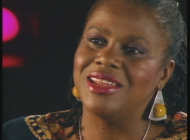 “Sound is a way to extend the territory you can affect. Communal singing is a way of announcing you are here and possessing the territory. When police or the sheriff would enter mass meetings and start taking pictures and names, and we knew our jobs were on the line, and maybe more… inevitably somebody would begin a song. Soon everyone was singing and we had taken back the air in that space.”
“Sound is a way to extend the territory you can affect. Communal singing is a way of announcing you are here and possessing the territory. When police or the sheriff would enter mass meetings and start taking pictures and names, and we knew our jobs were on the line, and maybe more… inevitably somebody would begin a song. Soon everyone was singing and we had taken back the air in that space.”
In this one hour film, Bernice Johnson Reagon, founder of the all women acappella group, Sweet Honey in the Rock, and curator of the Community Life Division of the Smithsonian Institution, discusses with Bill Moyers how black music has shaped the African-American experience and identity. 
Reagon traces the role of early spirituals rooted in the black church to their inspirational use in the early Civil Rights movement. “The songs are free and they have the meaning placed in them by the singers. It can just as easily be a resistance song as it can be this internal nurturing of the soul.”
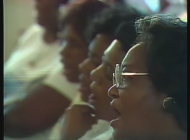 Reagon herself began singing in a small town church in Georgia — congregational singing, whereby somebody in the pews has just as much right to take the lead in a song as the soloist in the choir. In the 1960’s Reagon became an activist in the Civil Rights Movement and with several others formed the Freedom Singers who took the spirit and message of the Civil Rights Movement to northern universities and cities. She talks about some of the great women leaders of that movement. Women like Fannie Lou Hamer— “a fierce warrior” says Reagon. When she founded Sweet Honey in the Rock in the 1970’s singing everything from spirituals to blues, from gospel to jazz, they also wrote songs honoring heroines like Hamer and Ella Baker.
Reagon herself began singing in a small town church in Georgia — congregational singing, whereby somebody in the pews has just as much right to take the lead in a song as the soloist in the choir. In the 1960’s Reagon became an activist in the Civil Rights Movement and with several others formed the Freedom Singers who took the spirit and message of the Civil Rights Movement to northern universities and cities. She talks about some of the great women leaders of that movement. Women like Fannie Lou Hamer— “a fierce warrior” says Reagon. When she founded Sweet Honey in the Rock in the 1970’s singing everything from spirituals to blues, from gospel to jazz, they also wrote songs honoring heroines like Hamer and Ella Baker.
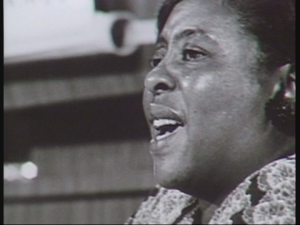
The film includes live performances, as well as a workshop given by Reagon whereby we see her extraordinary power as an educator and musicologist. In her interview with Moyers Reagon explains the special significance of the black church and its music in the growth of a powerful African-American culture.
Reagon’s work with Sweet Honey in the Rock continues the tradition of black music as a source of resistance, courage, strength and pride as well as determination and faith.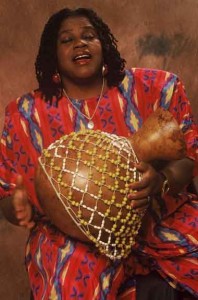

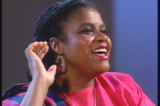
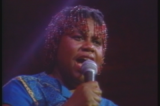
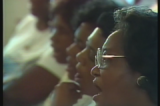
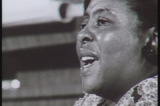


i miss her still, changed my life
[…] read the novel, and I thought I would share them here. In Dr. Beth’s class, I was introduced to Bernice Johnson Reagon who observed that “sound is a way to extend the territory you can affect…so people can walk […]
[…] The Songs are Free: Bernice Johnson Reagon and African American Music […]
Loved this video when I viewed it years ago. Would like to purchase it to show at my Neighborhood Association events. Can it be purchased?
[…] Rock, formed in the next year. “Sound is a way to extend the territory you can affect,’ she once said. “Communal singing is a way of announcing you are here and possessing the territory. When […]
I have listened to Jacob’s Ladder countless times and it still touches me so deeply. I would like to share a song with you , an American Spiritual written by an Irishman living in Ireland . This song needs to be performed by a group such as Bernice Johnson’s and this is just not a possibility in Ireland .
I would be most grateful for your suggestions as to where I might send it .
Thank you for your time.regards
Conor Sheehan
Where can I purchase The Songs are Free? I worked with Dr. Reagon and Sweet Honey 1978-1994. Thank you. Amy
Amy horowitz.Org
Roadworkcenter.org
Hi Amy,
I do not distribute the film, because I produced it with Bill Moyers. His company, at that time dalled Public Affairs Television, but now changed to Moyers media…but the film is distributed by Films for Humanities…their email link is on my site where you found this film…Gail Pellett Productions. Let me know that you were successful. I love this film. But I’m prejudiced. Thanks, Gail